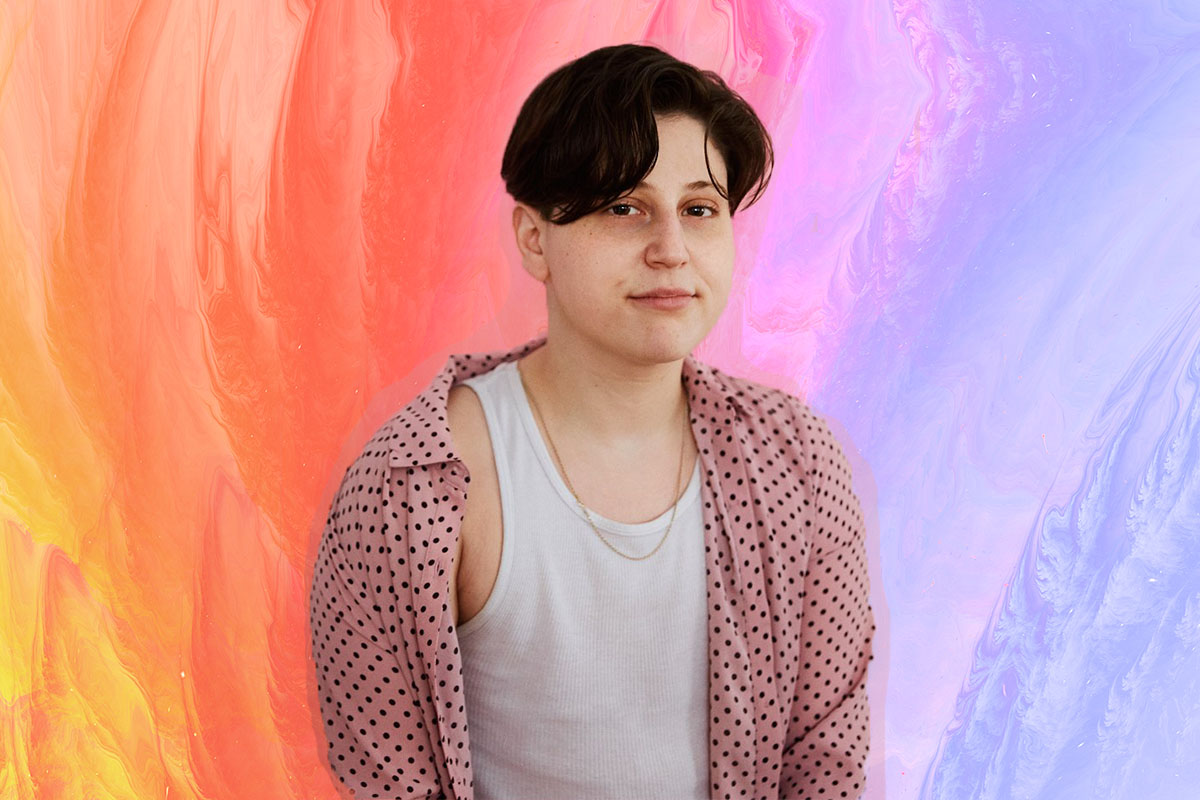My girlfriend and I broke up a few days before I first saw Mal Blum perform live. I only had a passing familiarity with their music, but caught between studying for finals and preparing to return home for winter break, I seized upon Mal Blum’s show at my school as the perfect distraction during a chaotic time in my life.
Blum, 32, is a musician whose music contains elements of both folk and anti-folk, with some punk thrown in. Whether it’s mournfully singing about the end of a relationship or pleading to be seen clearly for who they are, Blum’s steadfast commitment to authenticity and desire for connection is clear throughout their body of work. When you listen to their songs, you feel as though you’re being given a glimpse into their innermost thoughts, all informed by their relentlessly humorous self-awareness.
I spent the day before the show processing my breakup in the healthiest way imaginable: listening exclusively to Mal Blum during long, shivering walks around the well-trodden trails neighboring my college campus. By December, these trails were already blanketed in crisp, frost-covered leaves, signaling the onset of bitterly cold New England winters. Letting myself wallow to the downbeat of Mal Blum’s “Circus Heart Pt.1” allowed me to live out a moment pulled straight from every coming of age indie movie.
Coincidentally, their performance was scheduled for the fifth night of Hanukkah, which also happened to be a Friday night. I skipped attending a Hanukkah Shabbat dinner in favor of laying under my sheets for a few more hours of indulging in my post-breakup processing, of course while listening to Mal Blum on a loop.
All of these cliché freshman life events collectively added up to the ideal timing to see this artist perform live.
In many ways, the room where Blum performed was not an ideal place for any type of art, designed less for angsty college students to gather for a show and more for lectures and meetings. But it was, unintentionally, the perfect place to allow for a blurred line between audience and performer, especially one like Blum. Throughout performances, Blum allows themself brief interludes to recite poems, helping to open the stage up for a more participatory connection between audience and performer.
Virtually indistinguishable from the students who had gathered for the performance, Blum sat alone on a folding chair with their guitar slung across their back. Dimly illuminated by the vaguely institutional, collegiate lighting, they nervously read poems from their Notes app between songs about self-destructive habits and the turmoil of navigating relationships. Their visible nerves while reciting such vulnerable writing was entirely in line with their typical charming awkwardness.
Blum first began songwriting as a teenager, creating earnestly vulnerable lyrics with a rawness that has remained steady even as their popularity continues to rise. This tenderness remains a connective thread across all their albums, starting in 2008 with their self-released album Goodnight Sugarpop and all the way to their newest album, Pity Boy, which was released in July of 2019 with Don Giovanni Records.
Mal Blum’s self-deprecating sense of humor and tentative optimism is familiar to many queer Jews like myself. Just as Judaism is more than the sum total of oppressive experiences throughout our history, queerness isn’t simply an identity rooted in homophobia. But being queer is all too often accompanied by rejection, feeling ostracized, and micro-aggressions on seemingly all sides — from fraught relationships with family and friends all the way to the pain of invisibility.
https://www.instagram.com/p/B6b48R5llA0/
Although their songs’ subject matters often touch on heavier subjects, Blum’s dry approach to otherwise difficult topics typifies Jewish humor. Much of their melancholic lyrics is offset by Blum’s self-aware humor. In the midst of mourning the end of a relationship, Blum confesses to searching for comfort by “prayin’ to a god/ That I mocked since I was young.” It’s also a distinctly queered style of Jewish humor. For instance, even the title of their newest album, Pity Boy, is intended to be ironic, wryly calling up images of the stereotypical sad boy, belying the emotional depths of their album.
Humor, then, is often one of the best ways to make sense of such pain, from alienation to self-destructive tendencies. Throughout their music Blum tells stories centered on feelings of loneliness, self-sabotage, and the ups and downs of relationships — all of which are informed by their wry humor and self-awareness.
Blum also expresses their challenges within navigating relationships with romantic partners, family members, and friends in ways that challenge typical ideas about such relationships.
Pity Boy specifically touches on their experiences with unhealthy relationship dynamics, with Blum confiding that, “All that I want is for someone to take advantage of me/ Because I don’t know any other way.” By giving space for the jumbled mess of feelings that occur throughout the course of a relationship, Blum’s jarringly self-aware confessional verses remain unique in their candor.
Their queer, non-binary, and Jewish identities are tacitly and explicitly present in all sides of producing their music. Blum has been openly queer throughout their career, but Pity Boy marks a shift to an even more radical form of honesty. Songs like “See Me” exemplify the ways in which Blum expresses their disenchantment with a world that refuses to acknowledge their identity, pleading, “Why can’t they see me when I’m right here?” Despite, or maybe even because of, this threat of invisibility, Blum continues to perform and in doing so, ensures that their tentative optimism reaches a broader audience.
Blum’s tentative optimism reassured me while I was in the midst of an experience that would not be out of place within their own discography. That evening, sitting less than a dozen feet from Blum, I could feel something within myself shift: my ability to ask for others to really see me.
Image by Lou Bank / MalBlum.com



